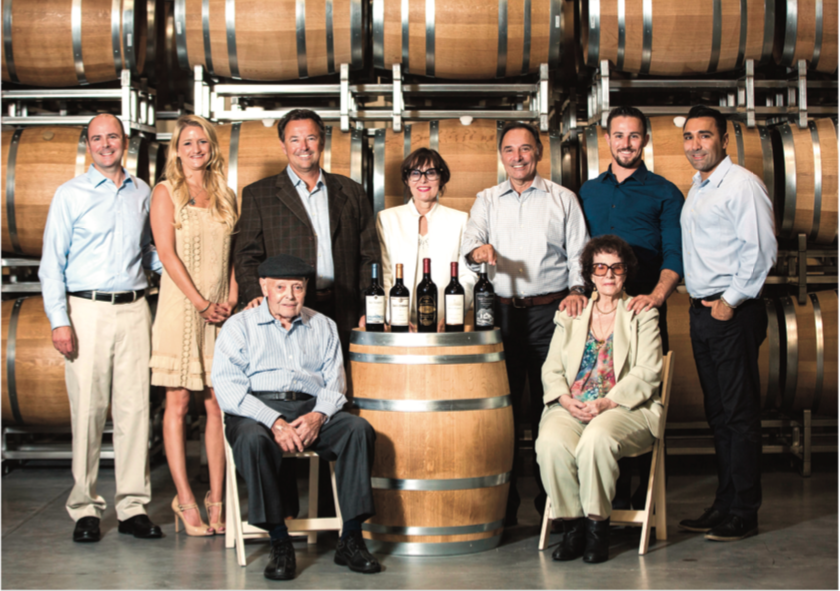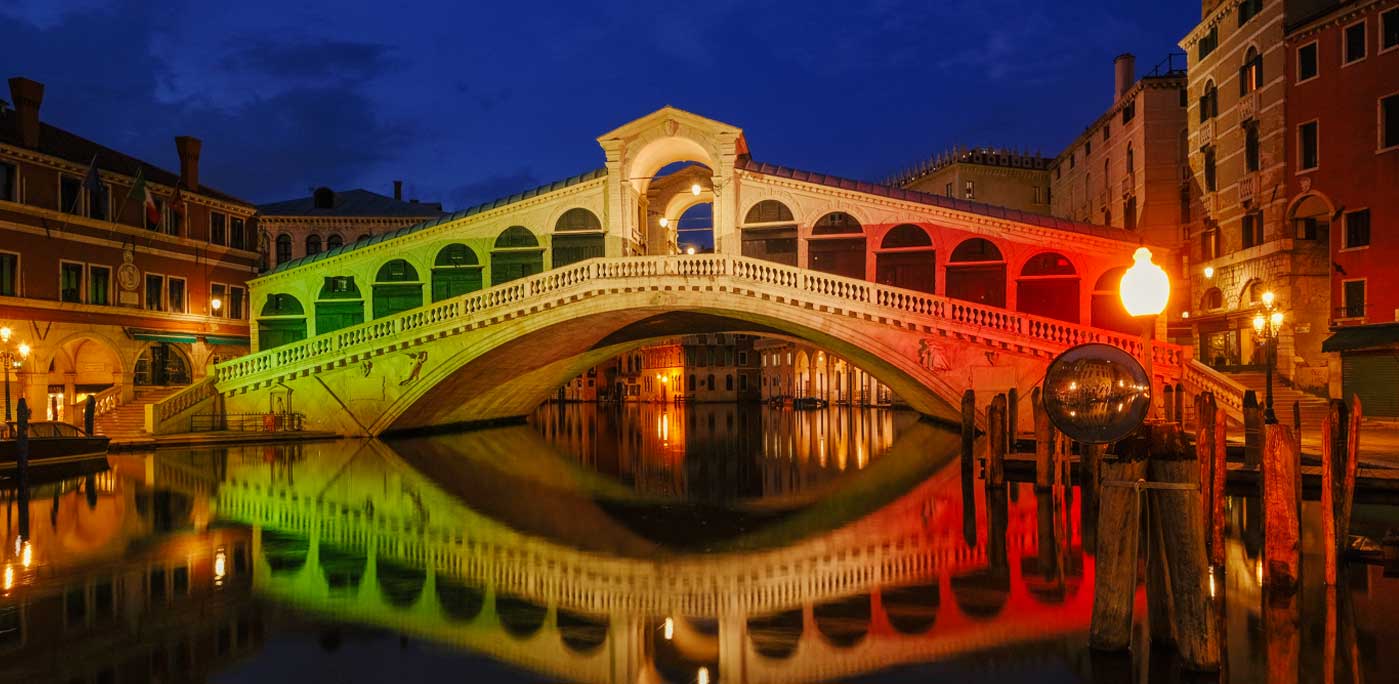Family life is made of plenty of things: of simplicity and mundanity, of smiles and fights, of daily routine and special moments, of love and many, many memories. Family life, when you think of it, is at the very heart of everyone’s personal heritage and personal “traditions:” what we eat on Christmas Day, the way we fold shirts, the recipe of tagliatelle, the way we cook our Sunday roast, it all comes down to how our family has always done it, to the way our mothers and grandmothers told us their own mothers and grandmothers used to do it.
All this stands true for the Ribolis, with an important addition: their family life and traditions are at the heart of LA’s Italian-American heritage, an essential sign of the relevance of Italian-American businesses in US economy and, not lastly, a living image of how an American dream, given resilience, creativity and determination, can indeed come true.
We of L’Italo-Americano had a chat with Dante Colombatti, fourth generation family member of Riboli Family Wines of the San Antonio Winery, and grandchild of its patriarch, Stefano Riboli, who recently passed away. With him, we discussed the family business’ history and current projects, but also took a walk down memory lane, chatting about Stefano and how his love for wine making was passed on to his children and grandchildren.
Dante, tell us something about the history of the winery, how did it all start?
When the winery opened in 1917 there were over 100 bonded wineries surrounding ours in what is now Downtown Los Angeles. All of those wineries went out of business during Prohibition in 1920, but we stayed strong. The San Antonio Winery made its path and stayed in business by shifting its gears and working with the Archdiocese of Southern California making altar wine. To this day we are the number one provider of altar wine in the United States. Throughout all of prohibition we stayed true to our roots, selling wine legally during a time when so many other wineries collapsed.
At the age of 14, Stefano, my grandfather, helped his uncle grow and change the winery, taking the business to the next level. Later in life, his wife Maddalena came in, and once again propelled the business to even greater heights.
The original winery was built using the box cart pieces from the Southern Pacific Railroad, which still exists to the day running along side the winery. Some of the box cart pieces are still being stored on property. The original “winery,” which was a small room, is now one of our banquet halls, The Vintage Room. You can rent out the room for parties and events.
Additionally, we are America’s original urban winery. This is a phrase that has been heard a lot lately, “urban wineries” or “urban breweries” but we started the trend over 100 years ago.
What are the first, fondest memories you have of the winery and the vineyards?
Starting from a young age, the one thing I really loved learning about was the people. I loved learning how to nurture our customers and understand how to provide them with the best quality of service and the best quality product. The biggest thing for both me, my family, and everyone here is understanding that, no matter where the customer is coming from financially or culturally, everyone is treated equally. We have a very diverse clientele and it is important that we all appreciate and understand that.
Additionally, in our family, you grow up learning to be a steward of the earth and to treat the land with respect in order to produce a product of the highest quality. That mentality stays with each and everyone of our family members and is something every generation makes sure the next takes to heart and understands. I think this sets us apart from all other wineries.
You own three estates, in Paso Robles, Monterey and Napa, for a total of ten vineyards, and you produce a wide variety of wines: do you have a personal favorite?
Being a millennial, I love all the fun blends we produce. I think there is something different and exciting about blends and the ones that we have coming out of Paso Robles stand out to me the most. My favorite is our Opaque Darkness, which is a zinfandel heavy red blend. I like it for multiple reasons. The first being the packaging, I think every great bottle of wine needs equally great packaging and the Opaque label stands out. Next, the juice. Opaque Darkness is a very smooth wine that goes down easily, has a full body and is very well balanced. Perfect to pair with most meals!
You have been producing wines in Europe, too, in Italy and in Portugal. Why did you decide to expand your production to the Old Continent, as well?
The fun thing to do when looking at the Old Continent for wine production is finding the trailblazers that are doing fun, new things. A lot of wine makers in Europe have the same mentality they have had for hundreds of years, which is not always conducive to the mentality of today’s consumer in America. We wanted to find people to partner with that are looking towards the future and are creative thinkers, but at the same time, stay connected to our roots. We partnered with these trailblazers to create exciting brands for the American consumer, like Mariella Rosé and Stella Rosa.
Your grandfather Stefano, the patriarch of San Antonio Winery, has recently passed away: do you have a fun or meaningful story about him you’d like to share with us?
My grandfather, Stefano, was an extremely kind, thoughtful, and loving person. He always treated the people and the community with respect. He taught me many lessons, from having empathy and respect for others, to always building for a bigger and better future.
One thing I always remember, was his attention to the smallest details. My grandfather was always someone who was very aware of details. Details meant a lot to him.
A great story I like to share is from when I was about 7 years old. I was helping him at the winery, learning as kids love to do and he was teaching me how to properly fold wine boxes. After much trial and error of boxes breaking through the bottom and bottles falling out, I finally got it down right. My grandfather made sure I paid very close attention to every detail, down to learning the correct way to fold a wine box, and that is a lesson I still take to heart today.
La vita familiare è fatta di tante cose: di semplicità e mondanità, di sorrisi e contrasti, di routine quotidiana e momenti speciali, di amore e tanti, tantissimi ricordi. La vita familiare, quando ci si pensa, è al centro del patrimonio individuale e delle “tradizioni” personali di ognuno di noi: quello che mangiamo il giorno di Natale, il modo di piegare le camicie, la ricetta delle tagliatelle, il modo di cucinare l’arrosto della domenica, tutto dipende da come la nostra famiglia lo ha sempre fatto, da come le nostre mamme e nonne ci hanno raccontato che lo facevano le loro mamme e nonne.
Tutto questo vale per i Riboli, con un’aggiunta importante: la loro vita familiare e le loro tradizioni sono al centro del patrimonio italoamericano di Los Angeles, segno essenziale dell’importanza delle imprese italoamericane nell’economia statunitense e, non da ultimo, immagine viva di come un sogno americano, grazie a resilienza, creatività e determinazione, possa davvero realizzarsi.
Noi de L’Italo-Americano abbiamo fatto due chiacchiere con Dante Colombatti, quarta generazione della famiglia Riboli della San Antonio Winery, nipote del patriarca, Stefano Riboli, recentemente scomparso. Con lui abbiamo parlato della storia dell’azienda di famiglia e dei progetti in corso, ma abbiamo anche seguito il filo della memoria chiacchierando di Stefano e di come il suo amore per il vino sia stato trasmesso ai figli e ai nipoti.
Dante, ci racconti qualcosa della storia dell’azienda, come è iniziato tutto?
Quando la cantina è stata inaugurata nel 1917 c’erano più di 100 cantine che circondavano la nostra in quello che oggi è il centro di Los Angeles. Tutte queste cantine hanno cessato l’attività durante il Proibizionismo del 1920, ma noi abbiamo resistito. La San Antonio Winery si è fatta strada ed è rimasta in attività cambiando marcia e lavorando con l’Arcidiocesi della California del Sud per produrre vino da messa. Ad oggi siamo il fornitore numero uno di vino d’altare negli Stati Uniti. Durante tutto il periodo del Proibizionismo siamo rimasti fedeli alle nostre radici, vendendo vino legalmente durante un periodo in cui così tante altre cantine crollavano.
All’età di 14 anni, Stefano, mio nonno, ha aiutato suo zio a crescere e a cambiare la cantina, portando l’azienda ad un livello superiore. Più tardi, arrivò la moglie Maddalena e, ancora una volta, spinse l’azienda ad un livello ancora più alto.
La cantina originale è stata costruita utilizzando i pezzi dei carrelli della Southern Pacific Railroad, che esiste ancora oggi e che corre lungo la cantina. Alcuni dei pezzi dei carrelli sono ancora custoditi nella proprietà. La “cantina” originale, che era una piccola sala, è ora una delle nostre sale per banchetti: la Vintage Room. È possibile affittare la sala per feste ed eventi.
Inoltre, siamo la cantina urbana americana “originale”. E’ una dicitura che si sente molto ultimamente, “cantine urbane” o “birrerie urbane”, ma noi abbiamo iniziato questa moda oltre 100 anni fa.
Quali sono i primi, più bei ricordi che avete della cantina e dei vigneti?
Fin da giovane, l’unica cosa che ho veramente amato sono state le persone. Mi è piaciuto molto imparare come fare a soddisfare i nostri clienti e capire come offrire loro la migliore qualità di servizio e il miglior prodotto di qualità. La cosa più importante per me, la mia famiglia, e per tutti qui, è sapere che, indipendentemente dalla provenienza economica e culturale del cliente, tutti sono trattati allo stesso modo. Abbiamo una clientela molto diversificata ed è importante che tutti noi ne teniamo conto e lo comprendiamo.
Inoltre, nella nostra famiglia, si cresce imparando ad essere custodi della terra e a trattare la terra con rispetto per produrre un prodotto di altissima qualità. Questa mentalità appartiene a tutti i membri della nostra famiglia ed è qualcosa che ogni generazione fa in modo che la successiva prenda a cuore e comprenda questa mentalità. Penso che questo ci distingua da tutte le altre cantine.
Possiede tre tenute, a Paso Robles, Monterey e Napa, per un totale di dieci vigneti, e produce una grande varietà di vini: ne ha uno preferito?
Essendo un millenial, amo tutte le piacevoli miscele che produciamo. Penso che ci sia qualcosa di diverso ed entusiasmante nelle miscele e quelle che sono prodotte a Paso Robles sono quelle che mi colpiscono di più. La mia preferita è il nostro Opaque Darkness, che è una miscela di zinfandel rosso scuro. Mi piace per diversi motivi. Il primo è la confezione, penso che ogni grande bottiglia di vino abbia bisogno di una confezione altrettanto notevole e l’etichetta Opaque spicca. Poi, il succo. Opaque Darkness è un vino molto morbido che scende facilmente, ha un corpo pieno ed è molto ben equilibrato. Perfetto da abbinare con la maggior parte dei pasti!
Producete vini anche in Europa, in Italia e in Portogallo. Perché avete deciso di espandere la vostra produzione anche nel Vecchio Continente?
La cosa bella da fare quando si guarda al Vecchio Continente per la produzione di vino è trovare i pionieri che fanno cose nuove ed entusiasmanti. Molti produttori di vino in Europa hanno la stessa mentalità che hanno avuto per centinaia di anni, il che non sempre asseconda la mentalità del consumatore di oggi in America. Volevamo trovare persone con cui collaborare, che guardano al futuro e sono creativi, ma allo stesso tempo rimangono legati alle nostre radici. Abbiamo collaborato con questi pionieri per creare marchi interessanti per il consumatore americano, come Mariella Rosé e Stella Rosa.
Suo nonno Stefano, patriarca della San Antonio Winery, è da poco scomparso: ha una bella o significativa storia su di lui che vorrebbe condividere con noi?
Mio nonno Stefano era una persona estremamente gentile, premurosa e affettuosa. Ha sempre trattato le persone e la comunità con rispetto. Mi ha dato molte lezioni, dall’avere empatia e rispetto per gli altri, a costruire un futuro sempre più grande e migliore.
Una cosa che ricordo sempre, era la sua attenzione ai minimi dettagli. Mio nonno era sempre molto attento ai particolari. I dettagli significavano molto per lui.
Una bella storia che mi piace condividere è quella di quando avevo circa 7 anni. Lo aiutavo in cantina e imparavo come amano fare i bambini mentre lui mi insegnava a piegare correttamente le scatole del vino. Dopo molte prove ed errori con scatole che si rompevano sul fondo e bottiglie che cadevano fuori, finalmente ho capito bene. Mio nonno ha fatto in modo che io prestassi molta attenzione ad ogni dettaglio, fino ad imparare il modo corretto di piegare una scatola di vino, e questa è una lezione che ancora oggi mi sta a cuore.






























